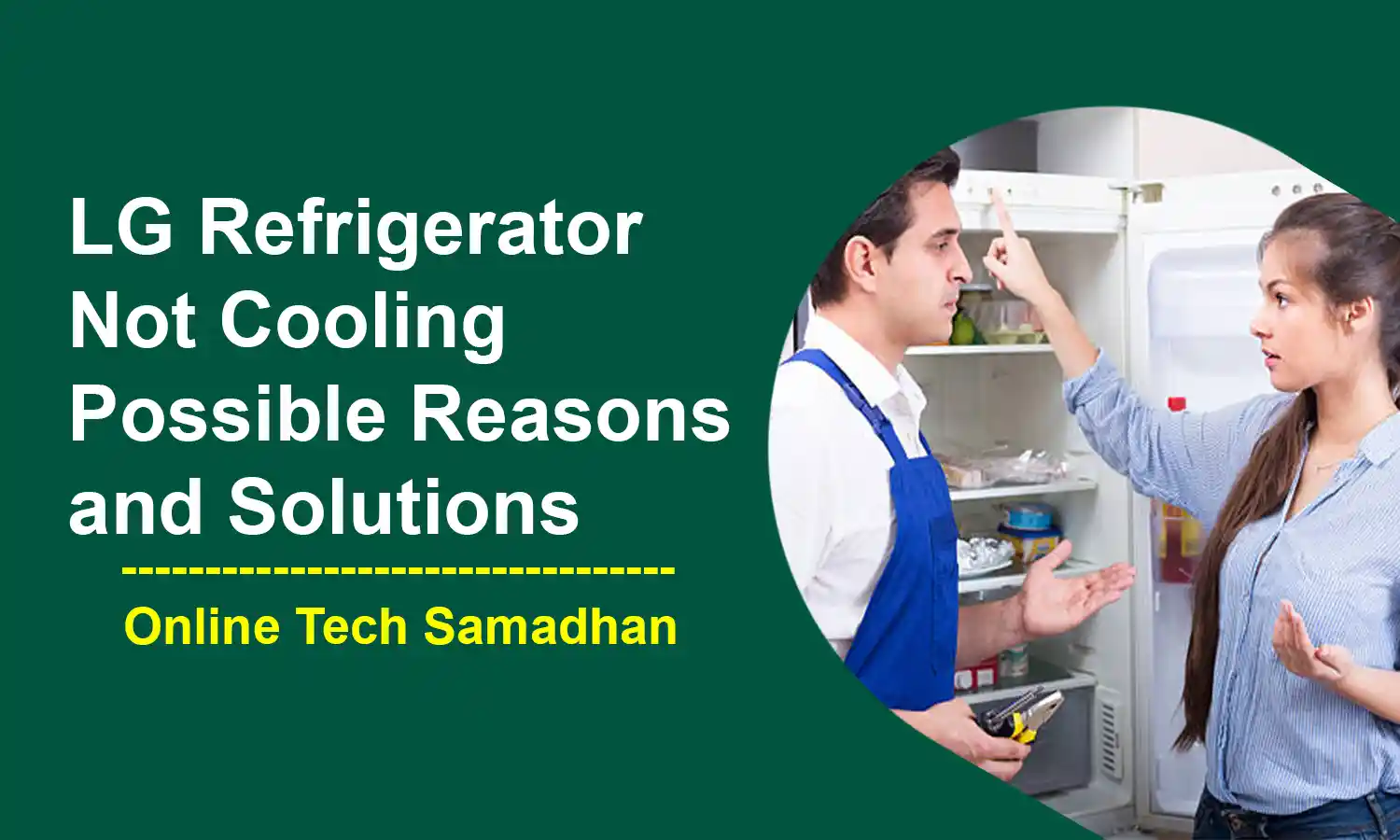LG Refrigerator Not Cooling: Troubleshooting Tips
If your LG refrigerator is not cooling properly, it can be quite frustrating. However, there are several common issues that you can troubleshoot on your own before seeking professional help. This easy-to-read guide will walk you through the steps to diagnose and possibly resolve the LG Refrigerator Not Cooling problem.
Common Reasons for LG Refrigerator Not Cooling
- Check the Temperature Settings:
Ensure that the temperature settings on both the refrigerator and freezer compartments are appropriately configured. The recommended settings are usually around 37°F (3°C) for the refrigerator and 0°F (-18°C) for the freezer. Make sure the settings haven’t been accidentally adjusted. - Verify Proper Air Circulation:
Check for any obstructions that might be blocking the vents inside the refrigerator and freezer compartments. Adequate air circulation is crucial for maintaining consistent temperatures. - Clean the Condenser Coils:
Dirty condenser coils can hinder the refrigerator’s cooling efficiency. Locate the coils (usually at the back or beneath the refrigerator) and gently vacuum or brush away any dust or debris. Clean coils ensure better heat dissipation. - Assess the Door Seal:
A faulty door seal can lead to cool air leakage, causing the refrigerator to work harder to maintain temperatures. Close a dollar bill in the door and try pulling it out. If you can do so easily, it might be time to replace the door gasket. - Check for Overloading:
An overloaded refrigerator can restrict airflow and lead to cooling issues. Make sure there’s enough space between items to allow air to circulate freely. - Monitor the Evaporator Fan:
The evaporator fan is responsible for circulating air over the cooling coils. Listen for the fan running when you open the refrigerator door. If it’s not running, it might need to be replaced. - Examine the Condenser Fan:
Similar to the evaporator fan, the condenser fan helps dissipate heat from the condenser coils. If it’s not working, the refrigerator might struggle to cool properly. - Defrost the Freezer:
If you notice ice buildup on the freezer coils, it could be affecting cooling. Perform a manual defrosting by unplugging the refrigerator and letting the ice melt. Remember to remove food items and place towels to catch excess water. - Check for Faulty Defrost System:
A malfunctioning defrost system can lead to ice accumulation and cooling problems. If the manual defrost doesn’t resolve the issue, the defrost timer, heater, or thermostat might need replacement. - Professional Assistance:
If none of the above steps solve the cooling problem, it’s time to contact a professional technician. They have the expertise and tools to diagnose and fix complex issues that might require specialized attention.

Another possible reason for the LG Refrigerator Not Cooling
1. The Condenser Fan Motor is Faulty
The condenser fan plays a crucial role in the cooling process by drawing cold air in from the outside to cool the condenser coil and compressor. If the fan is faulty or blocked by debris, the refrigerator’s performance is affected.
Solution: Repair the Faulty Condenser Fan Motor
- Power off the fridge.
- Clean the fan blades and ensure they rotate freely.
- If cleaning doesn’t help, replace the motor.
2. The Evaporator Fan Motor is Faulty
The evaporator fan circulates cold air through the evaporator coils, extracting heat. A faulty evaporator fan can lead to uneven cooling, with the freezer staying cold but the fresh food compartment warming up.
You May Love To Read
- CRSORGi CSC Birth & Death Certificate Application Guide 2024
- How to Open ITR PDF Password After Filing Income Tax Return
- itel S23 Plus Review: A Budget-Friendly Game Changer 2023
- Education Ministry Launches APAAR ID One Nation One Student ID through CSC
- IPL 2024 Schedule and Venues Revealed: Check the Schedule Now!
Solution: Replace the Evaporator Fan Motor
- Unplug the refrigerator and empty its contents.
- Remove the back wall from the freezer to access the fan motor.
- Replace the faulty motor with a new one.
3. The Inverter Linear Compressor Has Failed
LG’s Inverter Linear Compressor maintains stable temperatures for optimal food freshness. A malfunctioning compressor can lead to temperature fluctuations, affecting food quality.
Solution: Replace the Faulty Inverter Linear Compressor
- LG offers a 10-year warranty for the compressor.
- Contact LG support to get professional assistance.
4. Broken Compressor Start Relay
The start relay triggers the compressor to turn on and off. If the relay is faulty, the compressor won’t work effectively, leading to inadequate cooling.
Solution: Replace the Bad Start Relay
- Replace the start relay to ensure proper compressor function.
5. The Condenser Coils are Dirty
Dirty condenser coils trap heat and hinder the cooling process. Regular cleaning prevents this and maintains efficient cooling.
Solution: Clean Out the Condensing Coils
- Unplug the fridge and gently clean the coils using a brush or vacuum.
- Ensure the coils are free from dust and debris.
6. Faulty Thermostat
The thermostat regulates the internal temperature of the fridge. A defective thermostat can disrupt the cooling cycle, leading to temperature inconsistencies.
Solution: Replace the Faulty Thermostat
- Replace a malfunctioning thermostat with a new one to restore proper cooling regulation.
7. The Control Board is Broken
Modern refrigerators rely on electronic control boards. Malfunctions in the control board can impact cooling performance and require professional attention.
Solution: Replace the Main Control Board
- Try a hard reset by unplugging the fridge for several minutes.
- If the issue persists, contact LG support for professional repair.
Quick Tips to Prevent Future Cooling Issues
- Avoid overloading the fridge to allow proper air circulation.
- Keep the refrigerator and freezer doors tightly closed to prevent warm air from entering.
- Regularly clean the condenser coils to maintain efficient heat dissipation.
- Set the temperature to the recommended levels: 37°F for the refrigerator and 0°F for the freezer.
Conclusion on LG Refrigerator Not Cooling
An LG refrigerator not cooling can be a frustrating experience, but armed with the knowledge of potential issues and solutions, you can troubleshoot and resolve the problem. From faulty fan motors to malfunctioning components, identifying the root cause and taking appropriate action will help keep your refrigerator functioning efficiently and your food fresh.
By following these troubleshooting tips, you can often identify and possibly resolve the cooling issues with your LG refrigerator. Remember that safety is paramount, so if you’re uncomfortable performing any of the steps, don’t hesitate to seek professional assistance to ensure the proper functioning of your appliance.
FAQs of LG Refrigerator Not Cooling
How can I troubleshoot cooling issues with my LG refrigerator?
Identify the specific problem, such as a faulty fan motor, start relay, or control board. Follow the easy solutions provided to fix the issue.
You May Love To Read
- PDF Ko Edit Kaise Kare In Hindi?: Ashan Tarika Step by Step
- Save From Net: Download YouTube Videos for Free Online 2024
- PayZapp Offers: Install and Pay with PayZapp & enjoy Assured CashBack 2024
- How to Close Your Flipkart Pay Later Account 100% Solution
- Crop Insurance Made Easy with Crop Insurance App Download
Can I fix these issues myself?
For simple tasks like cleaning coils or replacing fans, DIY is possible. However, for complex issues, it’s best to consult a professional.
How do I clean the condenser coils?
Unplug the refrigerator, locate the coils (usually at the back), and gently remove dust and debris using a brush or vacuum.
What’s the importance of the inverter linear compressor?
LG’s inverter linear compressor maintains stable temperatures for better food freshness. It reduces temperature fluctuations.
How can I prevent cooling problems in the future?
Regular maintenance, proper temperature settings, and avoiding overloading the fridge can prevent future cooling issues.























